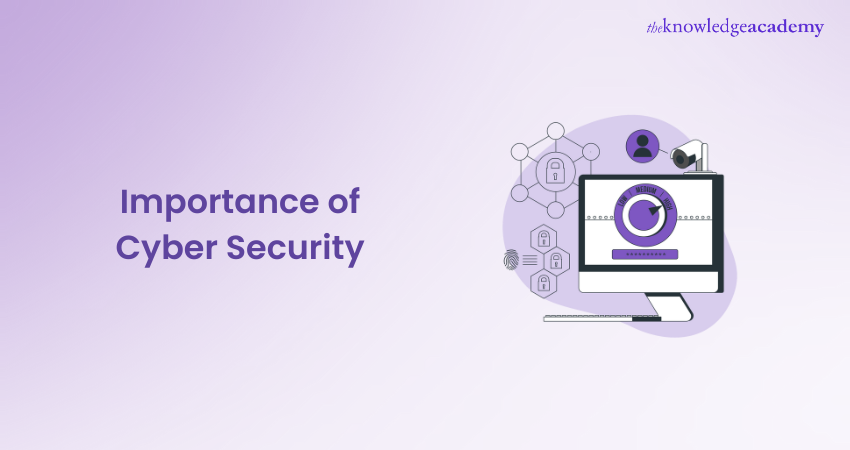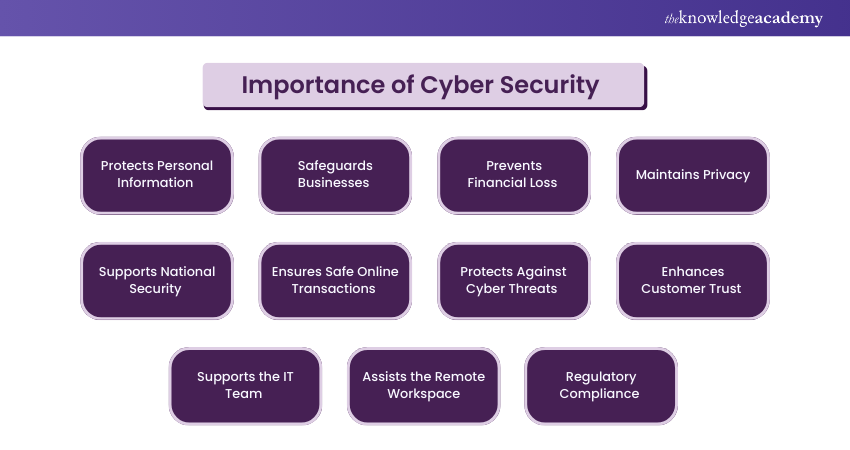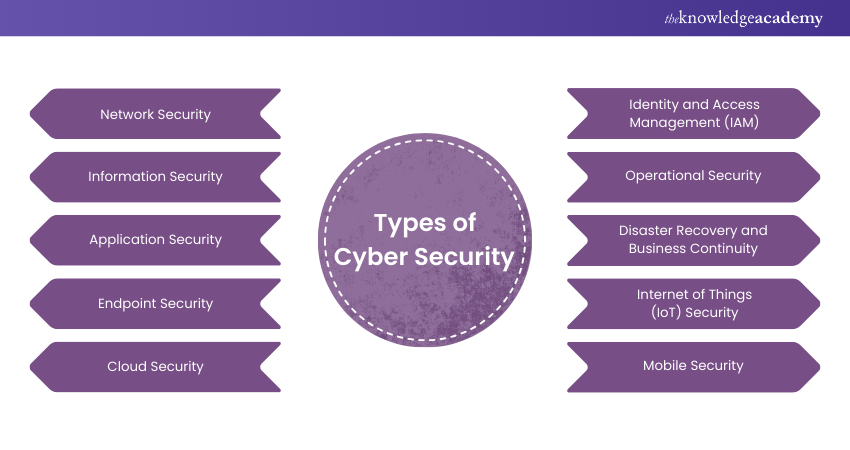We may not have the course you’re looking for. If you enquire or give us a call on +49 8000101090 and speak to our training experts, we may still be able to help with your training requirements.
Training Outcomes Within Your Budget!
We ensure quality, budget-alignment, and timely delivery by our expert instructors.

Imagine waking up to find your business's sensitive data compromised by a cyber attack. It's a nightmare scenario but one that's increasingly common in our digital age. The importance of Cyber Security cannot be underestimated – it's the backbone of safe, efficient business operations. Whether you're a small startup or a large corporation, understanding and implementing Cyber Security measures is crucial.
In this blog, we delve into the world of Cyber Security, exploring practical tips to protect your business from cyber threats. Join us as we guide you through the essential steps to keep your data secure and your operations running smoothly.
Table of Contents
1) What is Cyber Security?
2) Why Cyber Security is Important?
a) Protects Personal Information
b) Safeguards Businesses
c) Prevents Financial Loss
d) Maintains Privacy
e) Supports National Security
f) Ensures Safe Online Transactions
g) Protects Against Cyber Threats
h) Enhances Customer Trust
i) Enhances Customer Trust
j) Supports the IT Team
3) Types of Cyber Security
4) Conclusion
What is Cyber Security?
Cyber Security is the practice of protecting computers, networks, and data from digital attacks. It involves using various techniques to keep information safe from hackers. This includes measures like firewalls, anti-virus software, and encryption. Cyber Security helps ensure that personal and business data stays private and secure. By preventing unauthorised access and data breaches, it maintains the safety and integrity of digital systems.
Why Cyber Security is Important?
Cyber Security is crucial for several reasons, especially in today's digital world. Let's explore:

1) Protects Personal Information
Cyber Security ensures your personal data, such as bank details and passwords, stay safe from hackers and identity thieves. This protection helps prevent identity theft and financial fraud. It involves using encryption, secure passwords, and other measures. Without Cyber Security, your sensitive information could be easily accessed and misused. Everyone's personal information is valuable and must be protected. By securing your data, you can avoid significant personal and financial loss.
2) Safeguards Businesses
Companies rely on Cyber Security to protect their information and keep their operations running smoothly. A security breach can cause damage to their reputation. Cyber Security measures include firewalls, anti-virus software, and regular security audits. Businesses need to protect their data from cyber attacks to maintain customer trust. Effective Cyber Security ensures business continuity. Without it, businesses are at risk of significant disruptions.
3) Prevents Financial Loss
Cyber attacks can result in monetary damage for both individuals and businesses. These losses can come from direct theft or the costs of dealing with a breach. Effective Cyber Security measures, like monitoring systems and secureing payment methods, help prevent these losses. Cyber criminals often target financial information, making security essential. Protecting financial assets is a top priority for everyone. By investing in Cyber Security, you can save money in the long run.
4) Maintains Privacy
With proper Cyber Security, individuals and organisations can keep their private information confidential. This means only authorised people can access sensitive data. Privacy is a fundamental right, and Cyber Security helps protect it. Measures like encryption and secure access controls are vital. Without Cyber Security, private information can be exposed and misused. Keeping data private helps maintain trust and integrity.
5) Supports National Security
Governments use Cyber Security to protect critical infrastructure, such as power grids and communication networks. Cyber attacks on these systems can disrupt national security and public safety. Cyber Security measures include monitoring and protecting these critical systems. National security depends on the resilience of these infrastructures. Governments invest in Cyber Security to prevent large-scale disruptions. Protecting national infrastructure is a matter of public safety and security.
6) Ensures Safe Online Transactions
Cyber Security helps protect online transactions, making e-commerce and online banking safer for users. This involves securing payment information and personal data during transactions. Secure online transactions build trust between customers and businesses. Cyber Security measures like SSL Certificates and secure payment gateways are essential. Without proper security, online transactions are vulnerable to theft and fraud. Ensuring safe transactions is crucial for the digital economy.
7) Protects Against Cyber Threats
As cyber threats become sophisticated, Cyber Security measures help defend against malware, phishing attacks, and other malicious activities. This involves constantly updating security protocols and software. Cyber Security experts work to identify and neutralise new threats. Staying protected from cyber threats is an ongoing effort. Without proper security measures, systems are at high risk of being compromised. Effective Cyber Security protects against a wide range of cyber threats.
8) Enhances Customer Trust
Businesses that prioritise Cyber Security build trust with their customers. Customers feel more confident sharing their information and conducting transactions. Trust is essential for customer loyalty and business success. Cyber Security measures help reassure customers that their data is safe. Building trust through security can lead to increased business opportunities. Customers are more likely to engage with secure businesses.
9) Supports the IT Team
Cyber Security supports the IT team by providing the tools and protocols needed to safeguard systems and data. This enables them to manage and mitigate risks effectively. IT teams rely on Cyber Security measures to detect and respond to threats. Proper security tools make their job easier and more efficient. Cyber Security helps IT teams protect organisational assets. A secure environment allows IT teams to focus on innovation and improvement.
10) Assists the Remote Workspace
Cyber security is essential for remote work because it protects employees' devices and networks. This ensures secure communication and safeguards company data from potential threats. Remote work introduces new security challenges that Cyber Security addresses. Measures like Virtual Private Networks (VPNs) and secure access controls are crucial. Protecting remote work environments is vital for business continuity. Remote work can be a significant Vulnerability in Cyber Security.
11) Regulatory Compliance
Many industries have regulations requiring robust Cyber Security measures to protect data. Compliance helps avoid legal issues and penalties while ensuring data security standards are met. Regulatory compliance ensures that organisations follow best practices in Cyber Security. Cyber Security helps organisations meet these legal requirements. Adhering to regulations is essential for trust and legal protection.
Gain the skills to safeguard information with our Cyber Security Awareness Course – Join today!
Types of Cyber Security
Here are some common types of Cyber Security:

a) Network Security: Protects computer networks from unauthorised access and attacks using software and hardware tools like firewalls and VPNs. This ensures data flows safely across the network. It also includes monitoring network traffic for suspicious activity.
b) Information Security: Ensures data is protected from unauthorised access, changes, or destruction through encryption and access controls. This keeps sensitive information safe and confidential. It also involves setting permissions to control who can view or modify data.
c) Application Security: Secures software applications by identifying and fixing vulnerabilities throughout their development and use. This helps prevent attacks that exploit software weaknesses. Regular updates and patches are essential to maintain application security.
d) Endpoint Security: Protects devices like computers and smartphones from cyber threats using anti-virus software and monitoring tools. This ensures that individual devices do not become entry points for attackers. It also includes measures to secure data stored on these devices.
e) Cloud Security: Safeguards data stored in the cloud through encryption and user access management. This protects information from being accessed or stolen by unauthorised users. It also ensures that cloud services are configured securely.
f) Identity and Access Management (IAM): Manages who can access what resources, using methods like single sign-on and multi-factor authentication. This ensures that authorised individuals can access information. It helps prevent identity theft and unauthorised access.
g) Operational Security: Protects day-to-day business processes and prepares for potential security incidents with monitoring and response plans. This keeps operations running smoothly, even during cyber threats. It also includes regular assessments to identify and mitigate risks.
h) Disaster Recovery and Business Continuity: Ensures an organisation can quickly recover from incidents and continue operations by having backup and recovery plans. This minimises downtime and data loss. Regular testing of these plans is crucial to ensure effectiveness.
i) Internet of Things (IoT) Security: Secures connected devices and networks by ensuring only authorised devices can connect and regularly updating firmware. This prevents unauthorised access to IoT devices. It also includes monitoring these devices for unusual activity.
j) Mobile Security: Protects mobile devices and their data from cyber threats using device management tools and secure apps. This ensures data on mobile devices remains secure. It also involves measures to secure mobile communications and transactions.
Learn to analyse various types of malware with our Malware Analysis Course – Join today!
Conclusion
The Importance of Cyber Security cannot be overstated. It protects personal and business data from digital threats, ensuring privacy, financial safety, and smooth operations. From securing networks and applications to protecting endpoints and cloud services, Cyber Security measures are essential in today's digital world. By implementing strong Cyber Security practices, individuals and organisations can safeguard their information and maintain a secure environment against cyber threats.
Understand how cyber-attacks are executed with our Cyber Security Risk Management Course – Join today!
Frequently Asked Questions

Begin by evaluating your current security measures and finding any weaknesses. Implement basic protections like strong passwords, firewalls, and anti-virus software. Educate your employees about best practices and threats.

Start with basic, cost-effective measures like strong passwords and free anti-virus software. Invest in training employees about Cyber Security best practices. Gradually implement more advanced protections as your budget allows.

The Knowledge Academy takes global learning to new heights, offering over 30,000 online courses across 490+ locations in 220 countries. This expansive reach ensures accessibility and convenience for learners worldwide.
Alongside our diverse Online Course Catalogue, encompassing 17 major categories, we go the extra mile by providing a plethora of free educational Online Resources like News updates, Blogs, videos, webinars, and interview questions. Tailoring learning experiences further, professionals can maximise value with customisable Course Bundles of TKA.

The Knowledge Academy’s Knowledge Pass, a prepaid voucher, adds another layer of flexibility, allowing course bookings over a 12-month period. Join us on a journey where education knows no bounds.

The Knowledge Academy offers various Cyber Security Courses, including the Certified Cyber Security Professional Course, Cyber Security Awareness Course, and Cyber Security Risk Management Course. These courses cater to different skill levels, providing comprehensive insights into Information Security Risk Management.
Our IT Security & Data Protection Blogs cover a range of topics related to Cyber Security, offering valuable resources, best practices, and industry insights. Whether you are a beginner or looking to advance your Cyber Security skills, The Knowledge Academy's diverse courses and informative blogs have got you covered.
Upcoming IT Security & Data Protection Resources Batches & Dates
Date
 Certified Cyber Security Professional (CCS-PRO)
Certified Cyber Security Professional (CCS-PRO)
Fri 21st Mar 2025
Fri 23rd May 2025
Fri 22nd Aug 2025
Fri 5th Dec 2025







 Top Rated Course
Top Rated Course



 If you wish to make any changes to your course, please
If you wish to make any changes to your course, please


